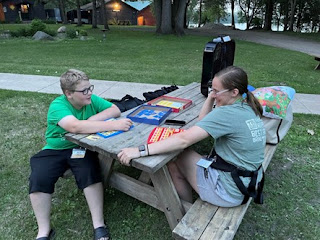Camp is an amazingly unique and powerful experience - especially residential or overnight camps. For many first-time campers, this is the first time away from family and with so many other youth their age for an extended period of time. This new environment - physical and social - often comes with some big feelings.
A well-designed, high quality youth camp can be a great opportunity for campers to learn about and practice navigating their emotions and reactions. Let’s dig into some tips...
Design programs to support campers:
- Create space in the schedule for smaller groups of campers and counselors to get to know each other.
- Have the opening session of camp outside! An open space can be easier to hear than a loud room.
- Share a basic schedule both verbally and posted in writing so campers know what to expect.
- Staff can model interactions with youth - specifically during transitions and meal time.
- Think about the location or space for each activity. The size of the space should align with the number of youth. Be aware of closeness to other small groups.
- Balance the schedule with large group, small group and even independent time.
- Build in time for counselors to take a break from campers and rejuvenate themselves.
Prepare counselors to support campers:
- Get to know your campers as individuals. Talk to each camper individually at check-in.
- Include conversations about the whole camper and what they bring with them to this new place.
- Ask questions. Inquire about their feelings about coming to camp.
- Share information about what is going to happen this week.
- Role model positive behavior and handling of emotions.
- Share your feelings about camp or a specific activity.
- Work with staff on recognizing triggers for any specific campers in your cabin.
- Counselors connect with each of their campers throughout the day. Chat with them while walking to the next activity, during meals, or during free time.
Healthy camp programs continue to improve each year. For those of you who have already gotten to experience camp this summer, what would you add to the design of your camp program? How did counselors work with campers throughout camp to ensure it was a positive experience?
-- Karen Beranek, Extension educator
You are welcome to comment on this blog post. We encourage civil discourse, including spirited disagreement. We will delete comments that contain profanity, pornography or hate speech--any remarks that attack or demean people because of their sex, race, ethnic group, etc.--as well as spam.

Comments
Post a Comment